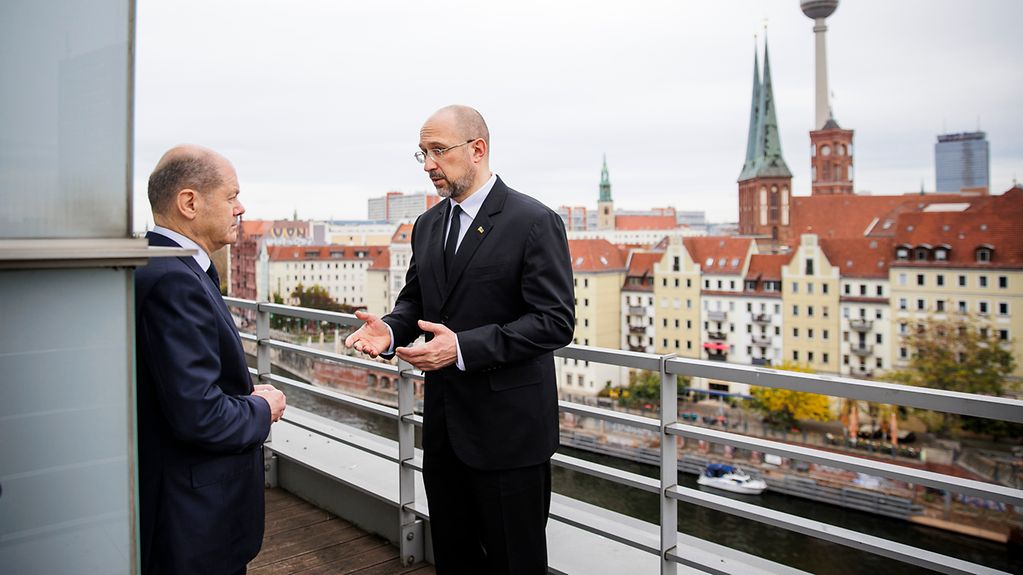Federal Chancellor opens German-Ukrainian Economic Forum
Support for Ukraine for as long as it is needed – this is what Federal Chancellor Olaf Scholz promised at the opening of the 5th German-Ukrainian Economic Forum in Berlin. Here, talks were held on how German business might be involved in the reconstruction of Ukraine.
3 min reading time

“Our meeting today has the potential to be the beginning of a transformative economic partnership between our countries,” said the Federal Chancellor.
Photo: Federal Government/Schmitz
The rebuilding of Ukraine would take generations, said Scholz, adding that no country, no donor and no international institution could do it alone. It was now vital to get together and set the course for the future, said Federal Chancellor Scholz at the opening of the 5th German-Ukrainian Economic Forum in Berlin. He noted that the German G7 Presidency and the EU were hosting an international conference of experts in Berlin on 25 October to discuss the reconstruction of Ukraine.
The aim was to jointly mobilise the international support that Ukraine so urgently needed, he said. The more coordinated and transparent this was, he added, the greater the international willingness to help, and the more private companies would invest in the reconstruction of Ukraine.
Ukraine is part of the European family
On 23 June, the European Council took the decision to grant Ukraine the status of candidate country. Ukraine was part of the European family, said Scholz, and it should join the European Union.
This decision sent out a signal to private investors, too, he said: anyone investing in the reconstruction of Ukraine today was investing in a future EU member state that would be part of the European legal community and the single market.
Linking trade and economies more closely, keeping healthcare stable – for the reconstruction of Ukraine, this meant building up the logistics sector, transport sector and transport infrastructure right away in such a way that Ukraine was fully connected to the EU single market, said Scholz. Export channels had to be kept open for Ukrainian products, stressed the Federal Chancellor. Ukrainian enterprises had to be strengthened, he said, and the development that had already begun towards a sustainably productive industrial and agricultural sector had to be advanced.
This would also mean supporting the Ukrainian health sector in saving lives, he noted, as German companies were already doing by donating medical products and medicines, for example, while at the same time permanently strengthening the health sector by supplying modern equipment, training and digitalisation.
Building a renewable energy economy
Destroyed energy plants and grids would not only have to be made functional again, said Scholz, their efficiency would also have to be increased in order to further expand electricity exports from Ukraine to the EU and gradually move Ukraine’s energy system towards climate-neutrality.
After all, thanks to the sun, wind and existing grids, Ukraine had an excellent basis to become not just a transit country but also an exporter of sustainably produced energy in the future, said the Federal Chancellor, adding that the enormous potential available here was demonstrated by the fact that initial agreements between German and Ukrainian companies were already being prepared.
Close partnership with Ukraine
The Federal Chancellor expressed his firm belief that the transformative economic partnership between Ukraine and Germany went deeper and further than before: it was a partnership that was already tapping into the great opportunities Ukraine would offer in the future. The Federal Chancellor said that relations between Germany and Ukraine had never been closer and that interest on the part of German and European business in becoming involved in Ukraine had never been greater.
The German-Ukrainian Economic Forum on 24 October 2022 was organised by the Association of German Chambers of Industry and Commerce (DIHK), the Committee on Eastern European Economic Relations (OA) and the German-Ukrainian Chamber of Industry and Commerce (AHK Ukraine), together with Ukrainian partner organisations. Taking place the day before the G7 expert conference, the forum will focus on the further expansion of bilateral economic relations between Germany and Ukraine and look at how German business can be involved in the reconstruction of Ukraine.